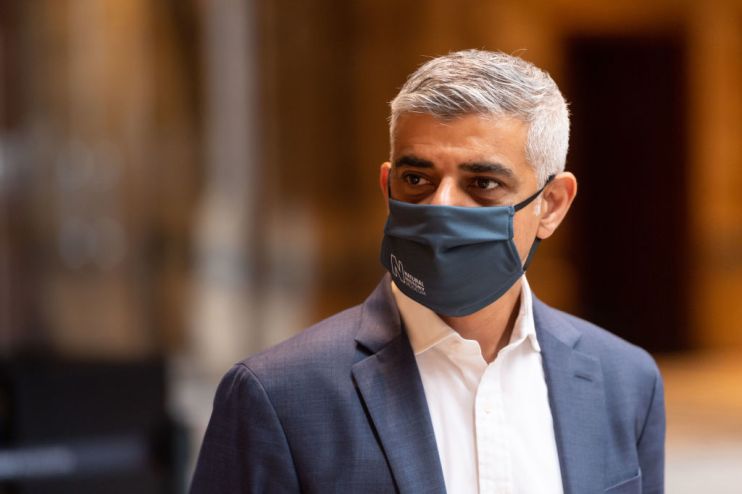Is Sadiq Khan’s re-election as London Mayor inevitable?

On Thursday 6 May, Londoners will go to the polls. Or, more likely, many won’t; turnout last time was 45 per cent to elect a new mayor, or else confirm the incumbent in office. This is the largest single exercise in democracy the UK has, excepting referendums, with an electorate of around five and a half million, and the winner will have the largest personal mandate this side of The X Factor.
Excitement should have been whipped up further by the fact that this contest is a year overdue, postponed from 2020 because of the Covid pandemic.
Yet anyone reading this will know that the prospect of the mayoral election has not set London ablaze. Unless you are a dedicated campaigner and party stalwart, you may hardly have noticed a campaign at all, and it is certainly not at the forefront of people’s minds. Admittedly the pandemic still dominates politics; but the mayor is the person who controls housing, transport, police and fire, and economic development. They are an international ambassador for London, that most international of cities, and if ever the capital needed its flag to be flown, in the wake of Brexit and (hopefully) the last stages of the pandemic, it is now.
The reason the election is generating so little excitement, of course, is that it is a foregone conclusion: we all know that Sadiq Khan will win a second term. He won handsomely enough in 2016, with 57 per cent support, and received 1.3 million votes, the largest mandate ever held by an individual British politician. However valid criticisms of his tenure may be – murder is at a 10-year high, the Elizabeth Line is horribly behind schedule and over budget, and he abandoned a campaign pledge to support rent freezes – there is no psephological indicator suggesting he is likely to be beaten. For the moment, London is Sadiq’s town.
There are two possible reasons for this. The first is demographic: London has long been a left-leaning city, with Labour predominating in its 32 boroughs. Even some affluent areas which, on paper, would read like happy hunting grounds for the Conservatives, continue to vote Labour or Liberal Democrat.
Brexit has thrown this into even sharper focus. The capital voted 60/40 for Remain, because of the strong economic and financial links to the Single Market, because of the cosmopolitanism of its population, because of its historical adherence to the Labour line. So Boris Johnson’s Union Flag-draped, bullish economic nationalism struggles for traction, while the Liberal Democrats have faded into irrelevance now that the European question is settled for the time being.
It is not just a matter of dust-dry voting patterns, however. Sadiq Khan was an adequate candidate for mayor, beating the more elegantly Blairite Baroness Jowell, who was in her late sixties (and who would die of cancer just a few years later). He was seen as left-wing enough, attracting support from Ken Livingstone and the union giants, the GMB and Unite, while also gaining the imprimatur of Oona King, whose career in corporate D&I lay ahead of her. His back story, as the son of an immigrant Pakistani bus driver, who had grown up on a council estate, was deemed sufficiently relatable and his folksy, tieless charm worked well on television.
The Opposition has failed to step up to the plate.
Shaun Bailey, the Conservative candidate, has a personal history which could have been crafted by Central Office: raised in a Jamaican family with a largely absent father, he underperformed at school and grazed the edges of criminality but was saved by the orderly rigour of the Cadets and gymnastics.
He then undertook charitable work helping underprivileged youngsters. But Bailey has proved extraordinary accident-prone and occasionally tone deaf: he shared a tweet which depicted Khan as the “mad mullah of Londonistan”; and after the disappearance of Sarah Everard he missed the public mood, tweeting that “it doesn’t have to be this way”, which many saw as crassly partisan.
The Liberal Democrats have done rather better.
Their candidate is former MEP Luisa Porritt. At 33 she is a young hopeful and speaks articulately and with feeling, and she was a journalist after studying at Sciences Po, the elite Parisian finishing school for French politicians and civil servants. But she is hobbled by her party: she is currently polling third (something no Liberal Democrat should take for granted after the past few torrid years), but around 10%. It is unlikely she will make a breakthrough before polling day. The Liberal Democrats have only ever shown strength in depth in London’s leafy riverside suburbs like Richmond and Barnes. Quite simply, they do not have the numbers.
Four more years, then, is the slogan of this election. Khan will certainly face fresh challenges arising from the pandemic, and the green agenda will come into even sharper focus with the UK’s hosting of the COP26 climate change conference in November. But there will be no seismic change till 2025, at least. One wonders, to paraphrase the hapless Shaun Bailey, if it has to be this way.